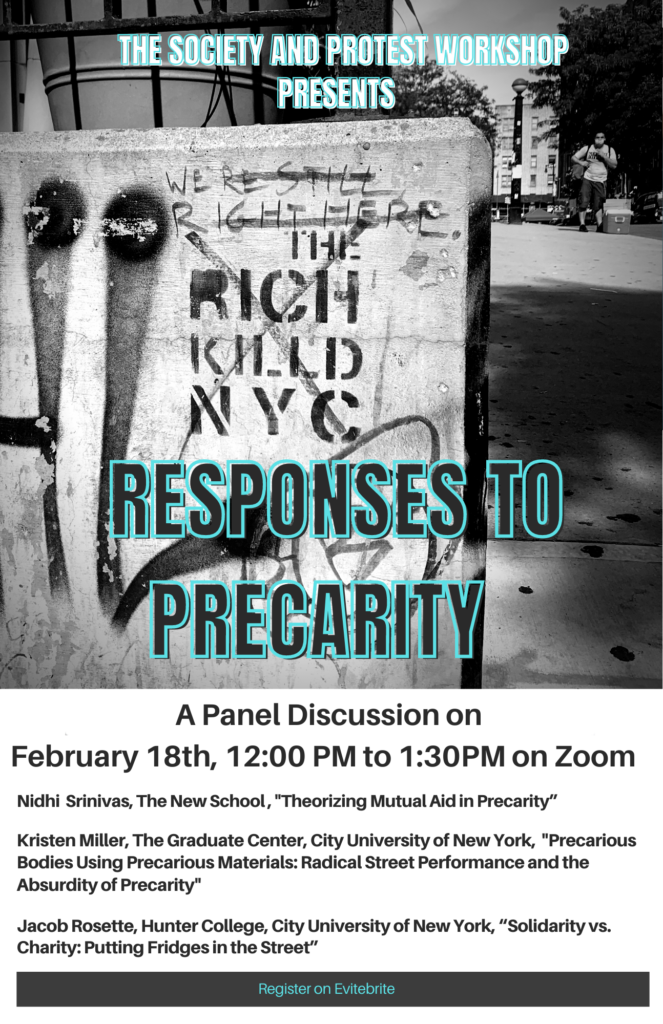A panel discussion investigating how different groups in civil society respond to conditions of precarity
Feb 18, 2021 | 12:00- 1:30 PM
Click here to register for the event

About this Event
This event features three presenters all investigating how different groups in civil society respond to conditions of precarity. This discussion explores solidarity, mutual aid, performance, and political participation in the face of increased political, societal, and capitalist pressures.
“Theorizing Mutual Aid in Precarity” by Nidhi Srinivas
Abstract: Current global conditions of precarity may uncover new forms of solidarities and organizational forms. The Covid 19 pandemic, and its changes to the global social and political landscape, have been theorized in structural terms, such as state authoritarianism (Agamben), groups defined as necropopulations (Mbembe, Shah & Lerche), the role played by infodemics in making disasters comprehensible (the Comaroffs), and presaging an enduring crisis of accumulation, moving from the “edges of capitalism” to its centers (McNally and Tyner). What would it mean to theorize differently, by attending to questions of organization and agency during this pandemic, not solely structural and social failures? An interesting response has been mutual aid groups, relying on extra-market transactions and socially enriched relations, comprising people otherwise marginalized or excluded. The term ‘mutual aid’ originates in 19th century anarchist traditions in which it represented a counterpoint to organized forms of capitalism. Mutual aid stood both for an alternative to dominant organizational forms, as well as a means of resisting them. For instance, it could be argued that mutual aid groups ameliorate the pandemic’s consequences today. But they may also signify an organizational alternative, that could become more urgent as the 2020 global recession worsens. Mutual aid is an alternative to abstracted market ties and describes enduring (and endearing) responses to the pandemic, globally: people helping each other out, even through barter, enhancing social engagement by singing together from balconies. My current research tracks groups that declare themselves as ‘mutual aid’ in three distinct settings, Hyderabad, India; New York City (Astoria); and Turin, Italy. My expectation is that ‘mutual aid’ signifies different relational configurations in these settings, shaped by local histories and power arrangements.
“Precarious Bodies Using Precarious Materials: Radical Street Art” by Kristen Miller
Abstract: Theater has long been a venue for reflecting on the social world and radical street performers have continued this tradition, using performance as a space to playfully rethink the current world order. This presentation will examine contemporary performance artists Stephen Varble and Dance to the People (DTTP). In the 1970s Varble was a trailblazer of genderqueer performances, using guerrilla tactics to disrupt New York City street life, banks, gender roles, and much more. Dance to the People is a New York City based performance collective founded in 2014, consisting mostly of immigrants, women, and people of color. In examining these performers I will answer the following questions: How do these contemporary performance artists interact with and engage the public spaces where they perform? And, how do these performances create a desire for what theater scholar and practitioner L.M. Bogad (2016) explains as critical catharsis, that which can only be achieved through political participation? To answer these questions I will explore both artists’ playful use of public space as a way to highlight social injustices, their shared decision to use trash as both a prop and a metaphor for the effects of capitalism, and the relationship between the body and precarity. I posit that performance is uniquely positioned to address issues regarding precarity due to the direct relationship between precarity and the body, exemplified by Stephen Varble and Dance to the People, whose queer immigrant bodies place them in precarious life positions. Their performances agitate audiences, creating a desire for critical catharsis and ultimately lead to new and creative ways or resisting the status quo. By using an absurdist aesthetic—both with regards to their performances and the found objects contained therein— these performance artists call attention to the fundamental absurdity of human precarity inherent in their positionalities, thus revealing injustices and oppressions that too often go unseen.
“Solidarity vs. Charity: Putting Fridges in the Street” by Jacob Rosette
Abstract: As states and markets have failed to meet basic social needs during the COVID-19 pandemic, as supply chains broke down and food systems were reorganized, as one in five people in New York City lost their jobs and up to 2 million face hunger every day, activists, community groups, non-profits, and collectives organized a decentralized network of solidarity fridges (or community fridges) under banners of mutual aid, distributing free food at almost 100 sites across the city (see map at nycfridge.com). Located outside bodegas, public housing complexes, community gardens, churches and mosques, businesses and restaurants, each refrigerator is maintained by a semi-autonomous group, connected and coordinated through social media and messaging apps. Food in these fridges comes from donations and fundraising, state programs, “food waste” recovery efforts, from kitchens reorganized around ‘food relief.’ A tension of “charity vs. solidarity” in the movement describes a contradiction: what many view as revolutionary direct action (“decommodification”) and dependence on capitalist (commodity) food systems implicated in the massive inequalities made visible by the pandemic. This presentation outlines the theory and practice for ongoing research focusing on a subset of groups that organize twenty fridges in Harlem, Washington Heights and the Bronx, using a framework of social metabolism to locate these fridges within a social process of exchange and transformation and social reproduction to describe a process organized both inside and outside of cycles of capital as a means to examine questions of power contained in this tension.
About the Presenters:
Nidhi Srinivas is an Associate Professor of Management at the New School. His research mobilizes critical theory to study a variety of topics, including management history, international development, mutual aid, ecological politics and civic design. He has published widely and been awarded several fellowships.
Kristen Miller is a second year PhD student in Sociology at the CUNY Graduate Center. Her work looks at performance art, and the role of the body in deepening desires for freedom, furthering social movements and alternative world making. Prior to attending graduate school Kristen worked within the Movement for Black Lives as a Senior Campaign Manager at Color Of Change. She received her BA from Northeastern University.
Jacob Rosette is a graduate student at the City University of New York in the Applied Social Research Program at Hunter College. He has worked in kitchens in and around NYC since high school in the late ‘90s, including as a line cook to support his BA in Sociology from CUNY in the ‘00s and more recently as a freelance chef and culinary operations consultant. Jacob’s research focuses on the political economy of urban food systems and the culture of kitchens. His MS thesis explores the phenomena of “ghost kitchens” and the mediation of digital platforms in the organization of food production in pre- and post-Covid-19 geographies of work.
Photo credit: Jessica Mahlbacher


